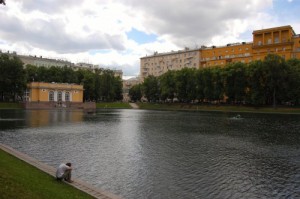PART 1
“’…So who are you, after all?’
‘I am a part of that power,
That ever wishes evil,
and ever accomplishes good.’”
Goethe, Faust
This a quote from Faust, but is also found at the beginning of the first chapter of a Russian novel I am translating. As I realized that I was translating a Russian translation of a German work I felt I was playing a game of ‘Whisper Down the Lane’, and wondered how I was contributing to a departure from the original statement.
The novel, Master and Margarita, by Mikhail Bulgakov, is one of the best known novels from the Soviet period. The story combines satire, farce and absurdity in ways that are both playful and dark at the same time. This follows a particularly Russian literary tradition (of which Nikolai Vasilievich Gogol is an outstanding example), that is often argued to be a response to efforts by the state to suppress dissent, and criticisms of political leadership. Russian writers learned they stood a better chance of getting away with such commentary by masking it with comedy, satire or fantasy, and readers learned to appreciate the underlying meanings.
The translation is slow going, but I love how each passage unfolds in the process, allowing me to more fully appreciate the art as well as the literal meaning of each sentence. This slow approach combines with my study of Russian history, culture and politics to give me greater insight into where Bulgakov is coming from and what he is trying to say. One passage that I especially love provides the first critique I’ve found by a Russian of what has become part of the Western narrative of Russia—an underlying streak of xenophobia, and mistrust of foreigners, that defines Russian society’s view of its place in the world.

I want to quote my translation of this passage here, but first, to set the scene: in the first chapter of the book two fictional members of Moscow’s intellectual elite—Mikhail Alexandrovich, the chairman of a literary association called MASSOLIT, for short; and Ivan Nikolaevich; a poet who goes by the pen-name Homeless—are hanging out at Patriarch’s Ponds, in Moscow, and discussing Jesus. In fact, the editor is lecturing the poet on how the historic record clearly shows that Jesus did not, in fact, ever exist. It is pointed out that, for some reason, the park and surrounding sidewalks are, except for these two companions, strangely devoid of people. From this point Bulgakov goes on:
“And here, just at the time when Mikhail Alexandrovich was telling the poet about how the Aztecs would fashion the figure of Vitzliputzli from dough, the first person appeared on the sidewalk.
Later, when quite frankly it was already too late, various agencies submitted their reports with descriptions of this person. Comparisons of these cannot but cause astonishment. Accordingly, in the first of these it says that this person was of short stature, had gold teeth and a limp in his right leg. The second, that the man was of enormous height, had platinum crowns and a limp in his left leg. The third laconically reported that this person had no special features.
It must be recognized that none of these reports will do.
First of all: he could not be described as limping on either leg, and his height was neither short nor gigantic, but simply tall. As for the teeth, on the left side he had platinum crowns, on the right, gold. He wore an expensive grey suit and imported shoes, of the same color as the suit. He had a grey beret stylishly crumpled over his ear, and under his arm carried a cane with a black handle shaped like the head of a poodle. By all appearances–of some forty odd years; a sort of curve to the mouth; a face smoothly shaven; dark haired; the right eye black, the left for some reason green; the eyebrows black, but one higher than the other. In a word—a foreigner.”
The last line reads like the punch-line to a joke. It implies that this description perfectly captures the essence of “the foreigner”—stylish, with subtle displays of wealth, but also enigmatic, and odd, if not outright strange. The two Russians go on to speculate in their minds what nationality this “stranger” is of: “Polish? . .” “French? . .” “A German.” They seem to settle on German, and the narrator subsequently refers to him regularly as “The German.”
This satiric portrayal of the way Russians view non-Russians puts me in mind of several things: the differences between the attitude of the state regarding foreigners and that of ordinary Russians; an ideological division of the intellectual elite, since at least the time of Peter the Great, between “Slavophiles” and “Westernizers”; the ways this definition is used in the West to justify its own distrust of that “other” nation. I will discuss these topics in later posts.
And keep in mind that these are the musings of someone who is, in a word—a foreigner.
